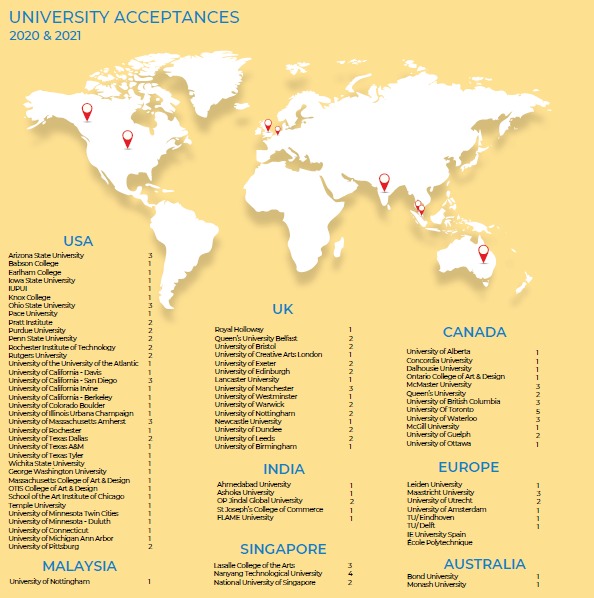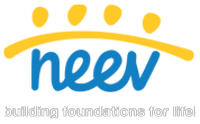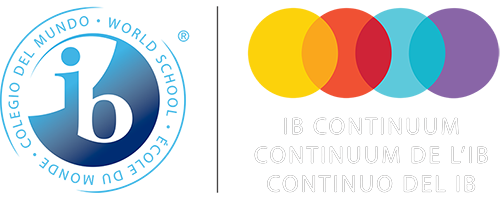- Libraries ( 1 each for PYP and Senior School)
- Science Laboratories
- Performing Art Studios
- Maker Space
- Dining Hall
- Tennis Courts
- Swimming Pool
- Basketball Courts
- Athletic Track
- Soccer Field
- Volleyball Court
- Regular school timings are 8.00 am to 3.00 pm. Stayback programme for students starts from Grade 4 upwards when students stay back for an hour till 4.00pm to train for activities selected for as a part of the school team.
- Collared T-shirts in 3 colours and dry fit T-shirts in 4 colours as specified by the school can be sourced from the vendor identified by school. Students can wear the T-shirts with any dark coloured shorts, track pants or skirts. Uniforms can be ordered online.
- School has an in- house kitchen where breakfast and lunch is prepared. The menu is shared with parents at the start of the month. Breakfast is provided to all students as a part of the fee scheme. However, availing lunch is optional and students can bring lunch from home if they desire to do so.
IB curriculum is experiential and enquiry based learning. Emphasis on building knowledge through understanding of concepts and real-world problem solving to develop critical and creative thinking skills. Curriculum is recognized widely by univerisities and colleges abroad. The subject options in High school caters to varied interests a child may have, encourages students to be independent learners and critical thinkers.
Traditional Curriculum has more focus on content and often skill building is not emphasized. There is dependence on text books for learning limiting a child's ability to know or explore more or think differently.
For PYP - the teachers would need to possess a diploma in teaching /BEd degree with relevant experience of teaching the age group . In Senior school it is a must to have a BEd or a Masters degree in the subject the teacher would be dealing with and minimum of 3-5 years of relevant teaching experience.
Attrition rate being low is an example of managing the staff well with our policies and perks in place. There are many opportunities for faculty/staff members to grow, by being a part of professional development programs being organized round the year. Salary is at par with industry .
Talking to students and parents about building routines, explaining consequences, working with students on developing time management skills, helping them build relationships, helps in students being disciplined.
Grade wise Homework schedule
In PYP, regular homework will be assigned. It will be assigned daily, stretching across UOI, Math and - Languages. Students should record their homework in Student Diary and grade teachers will check the same.
In MYP and DP, the homework assigned will be across all subject groups, but spaced out over the whole week. Students are expected to record their homework in the Student Diary.
- Grade 1 – 15 minutes/day
- Grade 2 – 20 minutes/day
- Grade 3- 30 minutes/day
- Grade 4- 40 minutes/day
- Grade 5 – 50 minutes/day
- Grade 6 – 60 minutes day
- Grade 7 – 60 minutes/day
- Grade 8 – 60 minutes/day
- Grade 9 – 80 minutes/day
- Grade 10 – 80 minutes/day
- Grade 11 and 12 - 80 minutes/day
The above timings do not include the following:B11
- For any reason, if a child has not been able to complete the assigned task in class, it can be sent home for completion and brought in the next day
- Regular self-study time when students are expected to read their course material in preparation for their daily lesson.
- Reading time for the set reading expectations for the grade
Today there are many leading colleges and universities in India that accept IBDP students for various courses.It is our endeavour as an IB world school to offer choices to students for studying in India and abroad. Our counselling team would be guiding students based on their subject choices , of universities and colleges in India for them to pursue their course. University visits, seminars and talks will be organised so that students can take an informed decision.
- Buses on GPS tracking and parents can log in to see the location of the bus in real time.
- Lady attendant on the bus both ways - Pick up and drop.
- CCTV cameras on all school buses.
- Entire campus under CCTV Surveillance
- Security staff and Protocols in Place
- Visitor entry registered and monitored
We recognize that each student is unique with individual needs. We provide support for students to help them adapt to Neev through a positive and respectful environment. The teachers through observation and baseline test, assess the strengths and challenges of a student. Based on the outcome and their observations, they plan the kind of support a student may need. The parents are also kept informed, thereby all concerned are a part of the child's learning journey. The students are given the necessary time for transition with the required support in school and a plan of action for reinforcement at home. Our Learning support team also works closely with the concerned students to ensure timely identification and intervention to enable them to work at their optimal potential.
Our calendar year would commence around the second week of July and end in the second week of May. For Grade 10 and 12, the month of May would be the schedule for exams.
BULLYING - There is zero tolerance for Bullying in school.
Following are some examples of what would constitute bullying by Neev Academy. It is however not comprehensive and the decision would be that of the school authorities.
- Pushing, kicking, hitting, punching, pinching, biting or any kind of physical violence, provoked or unprovoked, on any one in the environment.
- Verbal and/or written/electronically transmitted name-calling, racism, hurtful sarcasm, teasing, rumour mongering, graffiti notes or messages, slurs etc.
- Emotional exclusion, threatening gestures, cliques/coalition of exclusion etc.
Once noticed or notified of the above action, the student/s will be counselled and parents notified. On repetition of the same, student will face detention and/or suspension/expulsion from class/school.
Neev Academy is an intellectually challenging, creatively vibrant, and diverse community of children and teachers set up to meet the needs of a changing India
- Experiential learning - Field trips, expert visits and immersive hands-on experiences provoke a questioning mind, reinforce learning, allow genuine participation and create real understanding of concepts and skills.
- Reading - We focus on a strong reading program, to nurture Lifelong learners - grow to read, read to grow is our mantra. Reading builds knowledge, curiosity, awareness. We believe books enrich us. Reading and Writing is the currency of an IB school. Good readers are good writers!
- The school has an in- house team for career counselling. They guide and mentor the students with respect to career pathways, options of universities and colleges, timelines for applications and procedures and response to queries of parents and students regarding the same.
- Behaviour counselling involves working with students referred with behavioural issues to help reinforce positive behaviour through therapies and stop the ones that are not. The behavioural counsellor appointed by school supports in this area.
In PYP we have continuous evaluations during the year. The parents would receive a Term 1 and Term 2 report which is qualitative and has descriptive indicators mentioning the progress of the student. In MYP, for Grade 6 & 7 we have timed assessments which are marked on the calendar. For Grades 8 to 10 there are assessments and term end exams as well. Grade 10 and 12 have external assesments at the end of the year.
Use of laptops is a requirement for enabling students to research as per the demands of the curriculum. The students from Grade 6 are required to bring laptops to school. The guidelines are in place and the use of laptops is monitored. Students are not allowed to bring mobile phones to school. Only students of Grade 11 and Grade 12 can bring mobile phones to school with prior approval .
As per the school fee policy, there is no sibling discount offered.
Our students mainly seek admissions in reputed colleges and universities in India, USA, UK, Canada, Singapore, Australia, Ireland, Netherlands, Spain, France, Oman, Dubai and Malaysia, over the last few years, based on their areas of interest and subjects opted in the IBDP.

Guidance and support is provided to students throughout middle and high school on all aspects related to academics, learning, skill building and career counselling including subject choices and the application process through our student advancement cell (SAC). There is individualised support given to students through the learning enrichment, social emotional counselling, student life and career guidance teams which form a part of the SAC.
- Diagnostic Tests – Tests like ISA, Cialfo Personality test, Cialfo Learning styles assessment to name a few, are all undertaken by students in middle school and the beginning of high school to understand our students better. This helps in providing them in class or out of class support individually or as a whole class approach. Early identification of any problem is our goal.
- Workshops – We conduct workshops on self- regulation, organisation and time management as a part of learning enrichment with middle school students. Gradually, we move towards academic writing, resume and essay writing workshops with students in the senior grades.
- Mentoring support – Academic team members supported by our specialists team work with a small number of students to mentor and guide them in the crucial final years of high school. This results in individualised support in managing schoolwork, profile building activities, university guidance and social emotional support as and when needed, always with the aim of growing resilient and intrinsically motivated learners.
- Profile building opportunities – The team looking into Student Life provides the students with opportunities to pursue their personal interests, social cause or initiatives to make an impact in the society. The range of support varies from inter school/ intra school activities, national/ international Olympiads and competitions, interest and choice learning opportunities during and post school hours, internships and service opportunities.
- College Fairs – There are individualised University meet-and-greet sessions planned throughout the year. In addition there are two college fairs held on campus featuring universities from across the globe during the academic year.
- Profile Evaluation – The team helps students reflect and analyse their profiles in the final years of school and help them fill the gaps, if any, to meet the requirements to get into their dream universities. This is done through small group and individual sessions. The experienced members of the career counselling team work individually with the students guiding them in their selection of universities/colleges, choosing recommenders, writing essays, filling applications leading to timely submissions.











